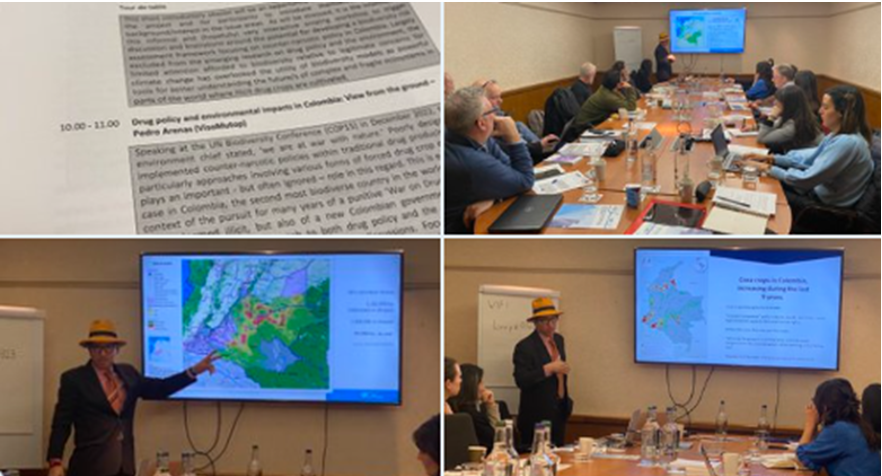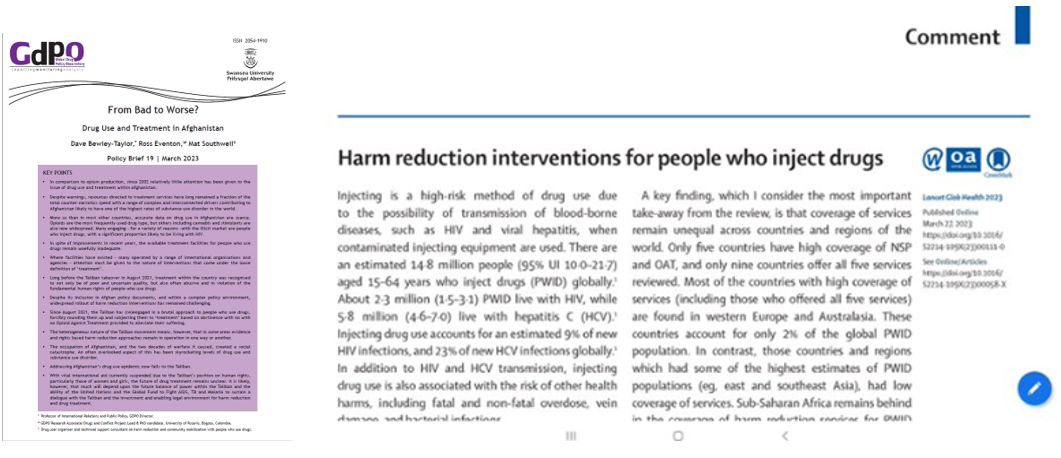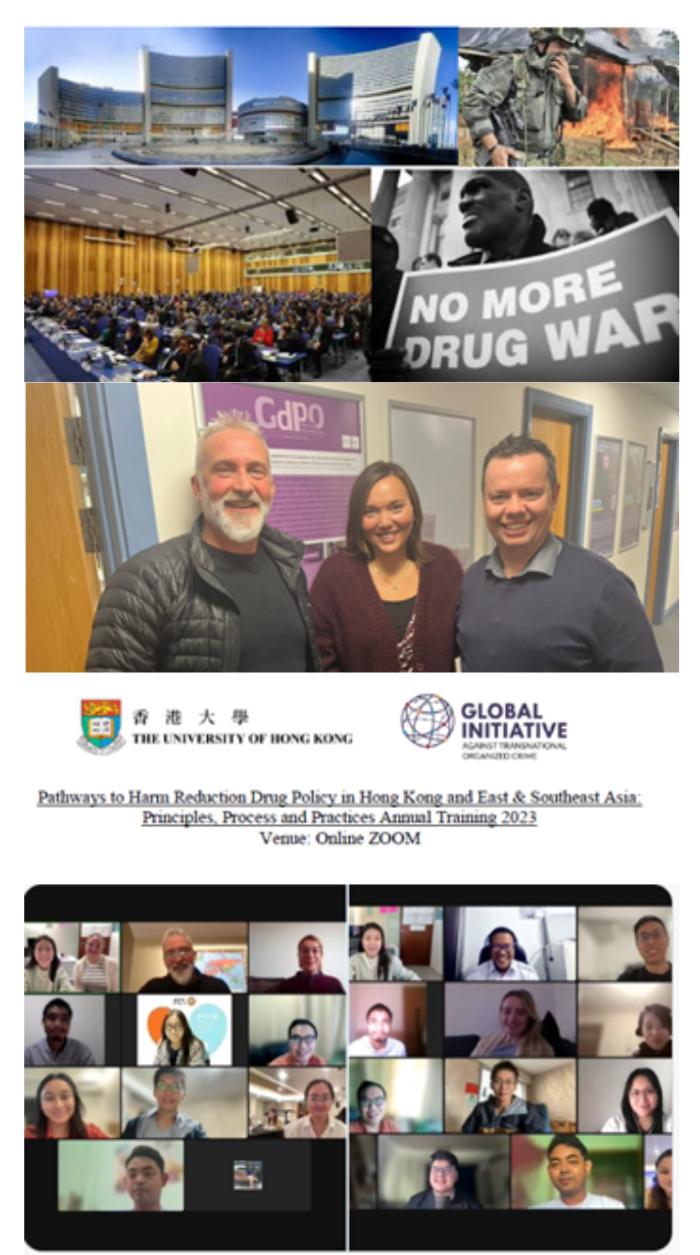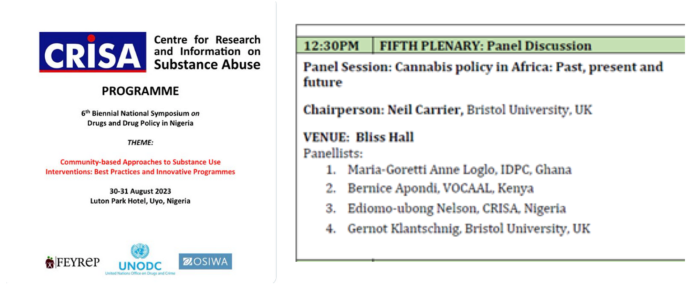Following the Christmas vacation, the GPDO, like many organisations working within the field of drug policy, set its sights on the 66th session of the UN Commission on Narcotic Drugs. The annual meeting of the central policy-making body of the United Nations system took place in Vienna, 13-17 March. Before attention shifted to Austria and related activities, however, the academic calendar continued with Dave’s MA module, The Global Governance of Drugs, including an excellent guest seminar from Dr Khalid Tinasti, former GDPO-Swansea University Honorary Research Fellow and research associate at the Geneva Graduate Institute . Focusing on "Great Powers’ and the IDCR: The United States and the Russian Federation – Reversing Roles?" Khalid’s on-line session fittingly touched upon many of the debates and issues that were to be seen in at the CND the following month. A few weeks later the GDPO also welcomed, this time in person, John Walsh, Director for Drug Policy and the Andes at the Washington Office on Latin America. During his time in Wales, John not only met with the team on future collaborations but also spoke with MA students on the role of civil society within the international drug control regime.
Building to some extent upon our previous work on the intersection between drug policy and the environment, the week before the CND saw the Observatory run a scoping workshop in London. Funded by a Swansea University Natural Environment Research Council ‘Discipline Hopping’ grant, ‘Counter-Narcotic Policy in Colombia: Developing a Biodiversity Risk Assessment Framework,’ was co-hosted with GDPO partner organisation Corporación VisoMutop en Colombia and involved as co-PIs Dave and Professor Luca Borger of the Department of Biosciences, Swansea University. Participants involved a range of experts from drug policy analysis, remote sensing, and ecology, including in terms of the latter from the Natural History Museum, as well as representatives of coca farmers in Colombia. After a productive and stimulating event, it is the intention that follow-on activities will include a number of publications, fieldwork in Colombia and further grant capture activities.

Pedro Arenas, Visomutop, presenting at the London scoping workshop, March 8th 2023.
The following week the GDPO was pleased to be a co-sponsor of a related side-event at the CND. Well attended by a range of diplomats, international civil servants, and members of civil society, ‘Aligning Drug policy with Environmental Protection’ included Dave’s presentation, ‘Regime Complexity: Implications for Drug Policy and Biodiversity’. With opening and closing comments from representatives of the governments of Colombia and Brazil, a recording of the entire event can be found here

Analysis of the UN multilateral system was also the focus of several publications over the course of the quarter. These included in January Dave’s The Spectre of Article 14: The INCB Report for 2021, Regulated Cannabis Markets and the Board’s Potential Enforcement Measures, (a co-branded IDPC-GDPO report) and in March his contributions to a TNI-WOLA Long Read/Commentary. Co-authored with Tom Blickman and Martin Jelsma (TNI) and John Walsh, Wilful Blindness: INCB Can Find Nothing Good to Say on Cannabis Legalisation is a brief response to the INCB’s Annual Report for 2022. On a related issue, we were pleased to see the publication of a GDPO supported piece of work focusing on the dilemmas of cannabis regulation within the European Union. The very timely ‘Cannabis Regulation Through the “Without Right” Clause in Article 2(1) of EU Framework Decision 2004/757/JHA on Illicit Drug Trafficking,’ by Piet Hein van Kempen and Masha Fedorova (Radboud University, The Netherlands), was published in the European Journal of Crime, Criminal Law and Criminal Justice. Another long in gestation output was the GDPO Drugs and Conflict Project Policy Brief, ‘From Bad to Worse? Drug Use and Treatment in Afghanistan.’ With the original idea for the Brief dating back to the GDPO-TERI-AREU Executive Programme in New Delhi in March 2020, this was co-authored by Dave, Ross Eventon (GDPO Research Associate/Drugs and Conflict Project Lead and PhD candidate, University of Rosario, Colombia) and Mat Southwell (Drug user organiser and technical support consultant on harm reduction and community mobilisation with people who use drugs). Research for the Brief drew not only on online interviews with treatment providers within Afghanistan, but also data gleaned from Mat’s work in Kabul in January 2023.
In relation to our Africa Project and within the academic realm, Ediomo-Ubong published ‘Police Extortion and Drug Dealers’ Negotiation Strategies: Exploring the Accounts of Street-Level Dealers in Nigeria’ in International Criminal Justice Review in February. Also of note during the quarter was his important Comment piece in The Lancet Global Health the systematic review of global coverage of interventions to prevent and manage drug-related harms among people who inject drugs.





.png)








